- Why Us?
- Features
White Label
For SaaS Platforms & Agencies
Provide our complete analytics suite to your clients, directly within your own interface and with your/their own branding. Discover Analytics-as-a-Service and White Label Analytics. Great benefit, minimal effort.
- Pricing
- White Label
- Success Stories
- Partner
- ResourcesExpand Your Knowledge

Simon Coulthard January 19, 2026
11 min
Top 10 Web Statistics Tools in 2026

Web statistics are the foundation of digital decision-making.
Traffic sources, popular pages, bounce rates, and visitor locations all help you understand what’s working - and what isn’t - on your site.
Google Analytics is the biggest name in the game. But with its many drawbacks - and marketers increasingly disenchanted by its clunky, inaccurate, and privacy-ignoring setup - we’ve rounded up the best web statistics tools that more than give Google a run for its money.
While some of these platforms also include advanced features like behavior analytics or eCommerce insights, this article focuses specifically on tools built for clear, reliable traffic data.
If you want to know which web statistics platforms are worth building your marketing around, then read on.
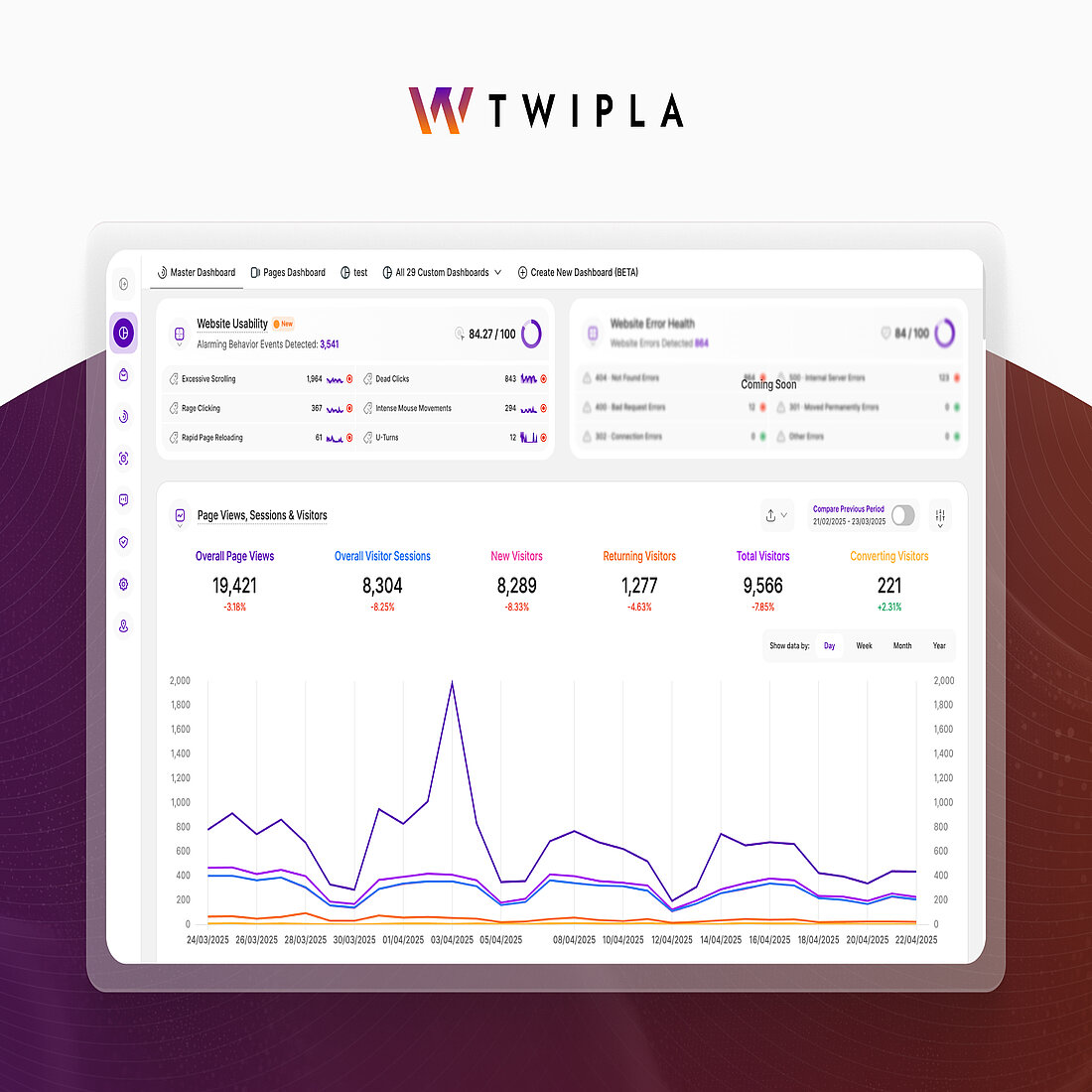
1. TWIPLA
TWIPLA is a privacy-flexible website statistics platform that delivers real-time insights into visits, page views, referrers, geolocation, devices, and browsers - all without cookies or personal data. As a complete website intelligence solution, it also includes behavior analytics, visitor communication tools, and an eCommerce analytics module.
Free Trial: 40 days.
Free Plan: Yes.
Pricing: Four paid plans, with prices starting at $2.39/mo. Additional custom enterprise plan also available.
TWIPLA provides a complete suite of web statistics modules that let you understand website performance from every angle. You get real-time data on everything from traffic sources and page performance to exit paths, UTM campaigns, industry benchmarking, and eCommerce.
But this isn’t just another statistical tracker. TWIPLA also includes visitor behavior analytics tools like session replays, heatmaps, funnels, and event tracking. As a result, you don’t just see what’s happening, you understand why. And because all these tools are fully interconnected within a single website intelligence solution, you unlock deeper insights and data synergies that simply aren’t available elsewhere.
For the privacy-conscious, TWIPLA can be calibrated to comply with any or all global privacy laws. Its cookieless tracking system bypasses consent requirements, removing the need for cookie banners, and delivering full traffic visibility - more data, more accuracy, better decisions.
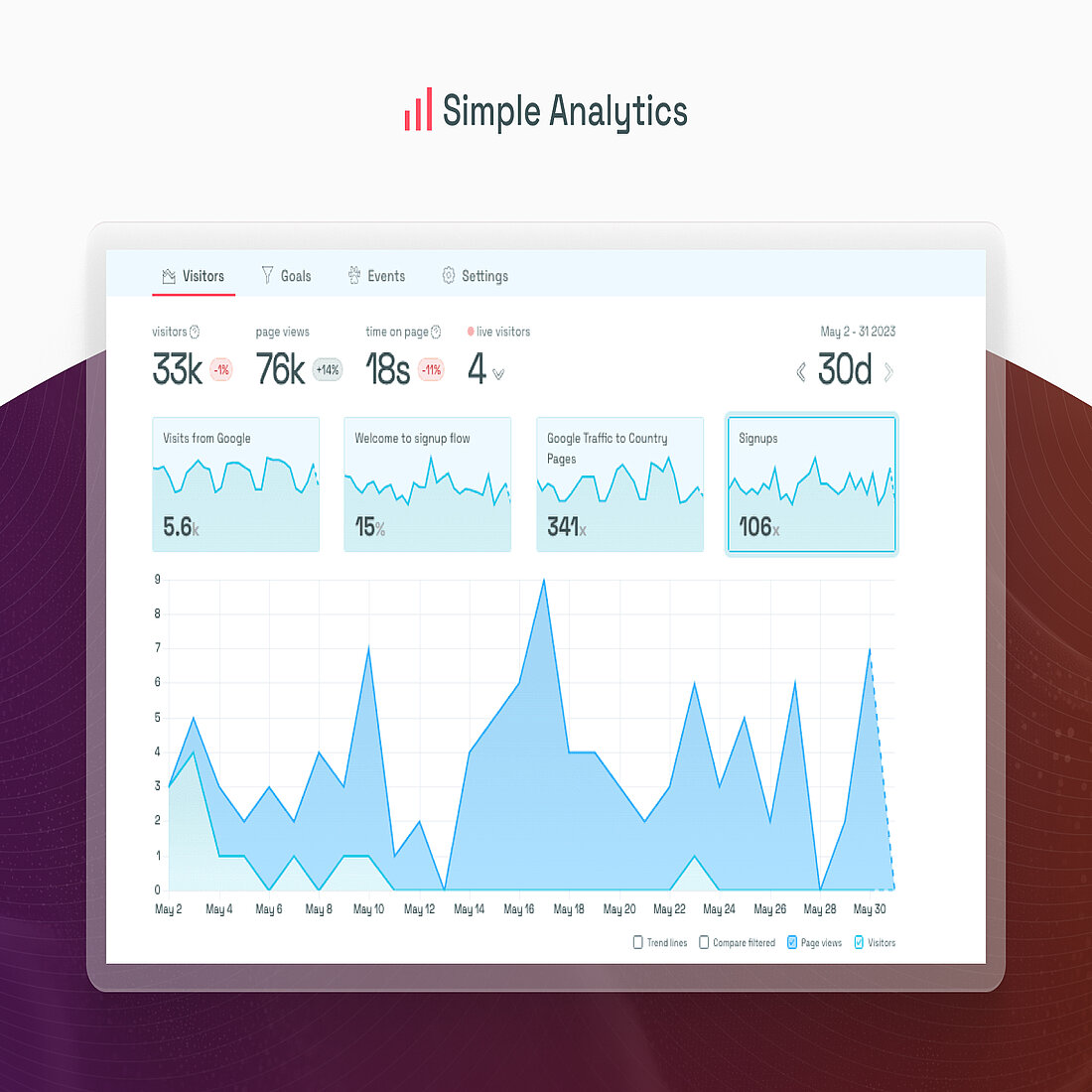
2. Simple Analytics
Simple Analytics is a privacy-friendly web statistics tool built for clarity over complexity. Its stripped-back design helps you focus on trends, not tabs - making it ideal for anyone who wants fast, actionable insights without the clutter.
Free Trial: 14 days.
Free Plan: Yes, but data history is limited to 30 days.
Pricing: Two paid plans, with prices starting at £15/mo. Additional enterprise plan also available.
What’s great about Simple Analytics
Simple Analytics lives up to its name with a beautifully minimal interface that strips out distractions and focuses on what matters: page views, referrers, device types, and events. The dashboard is fast, responsive, and easy to customize with goals, custom events, and shared public links. It’s ideal for developers, designers, and marketers who want actionable stats without navigating a maze of menus. Setup is quick, and the team behind it is highly responsive, often shipping fixes or new features the same day they’re requested.
What’s not so great
The platform’s simplicity comes at the cost of depth. You won’t find detailed segmentation, funnels, or custom filtering beyond the basics, and users often turn to external tools to get the visualizations they need. While documentation is solid, beginners might struggle to set up features like custom domains or event tracking without a few trial-and-error moments.
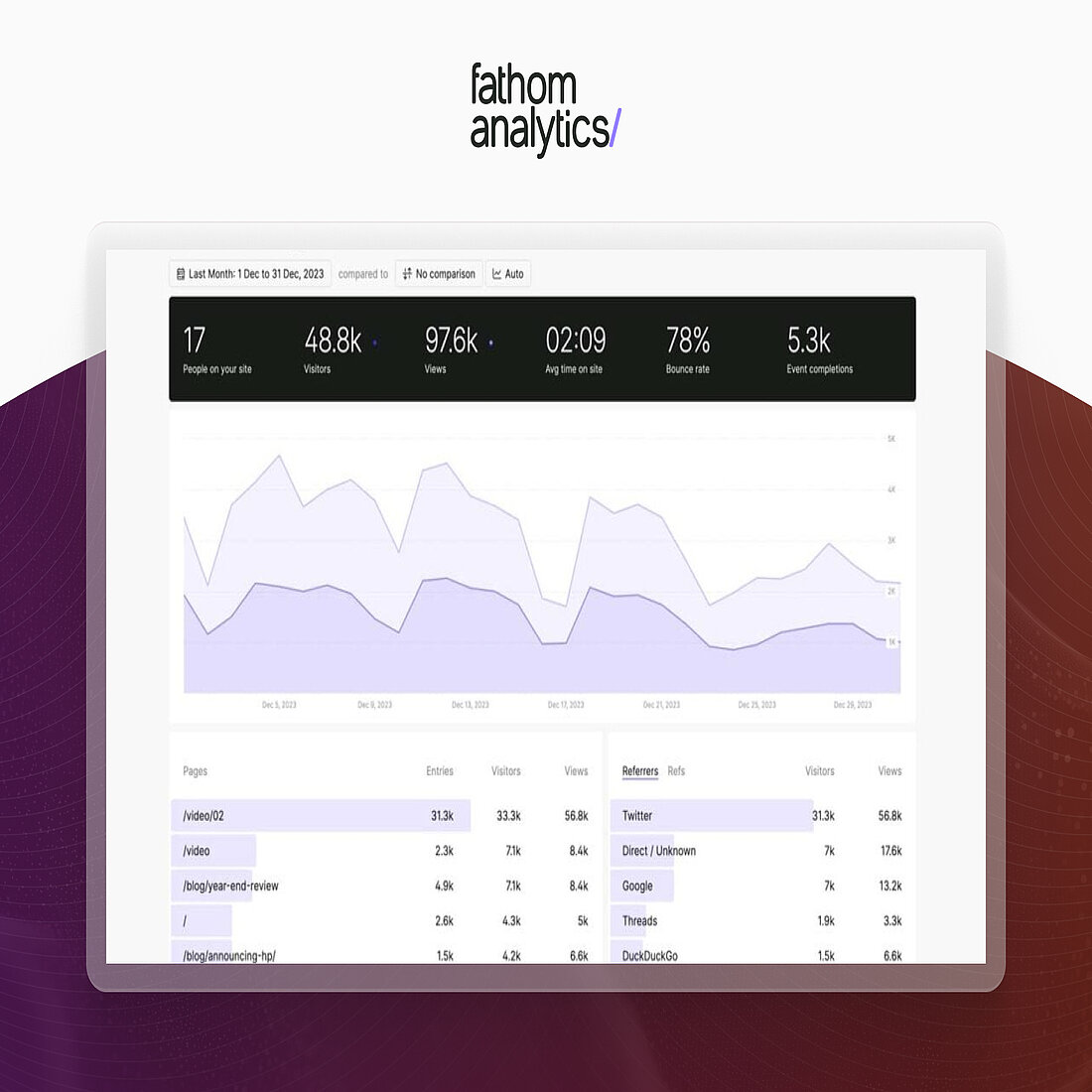
3. Fathom Analytics
Fathom Analytics is a lightweight website statistics platform built for speed, simplicity, and privacy. It gives you clear insights into traffic, top content, referrers, and device types while remaining fully GDPR-compliant without using cookies.
Free Trial: 30 days.
Free Plan: No.
Pricing: One paid plan starting at $15/mo.
What’s great about Fathom Analytics
Fathom is a fast, no-clutter website statistics tool built for simplicity and privacy. It’s lightweight, easy to install, and runs efficiently thanks to its Go and Postgres architecture. It shows just what most people need like unique visits, top pages, referrers, devices, and countries without unnecessary bloat. You also get built-in UTM tracking and clean, accessible dashboards that make it hard to get lost in the numbers. It’s ideal for people who want useful stats without the overload.
What’s not so great
Despite its privacy-first branding, there’s debate over whether Fathom’s fingerprinting methods require consent under regulations like ePrivacy. The platform is intentionally limited in depth, which can frustrate users looking for advanced breakdowns or behavioral insights. It doesn’t offer enough visibility into visitor behavior or conversion flows, and to stay compliant with certain features, a cookie consent banner is still required - undermining its compliance credentials. There’s also no free plan, and it’s not ideal for those who need segmentation, funnel tracking, or more detailed analysis.
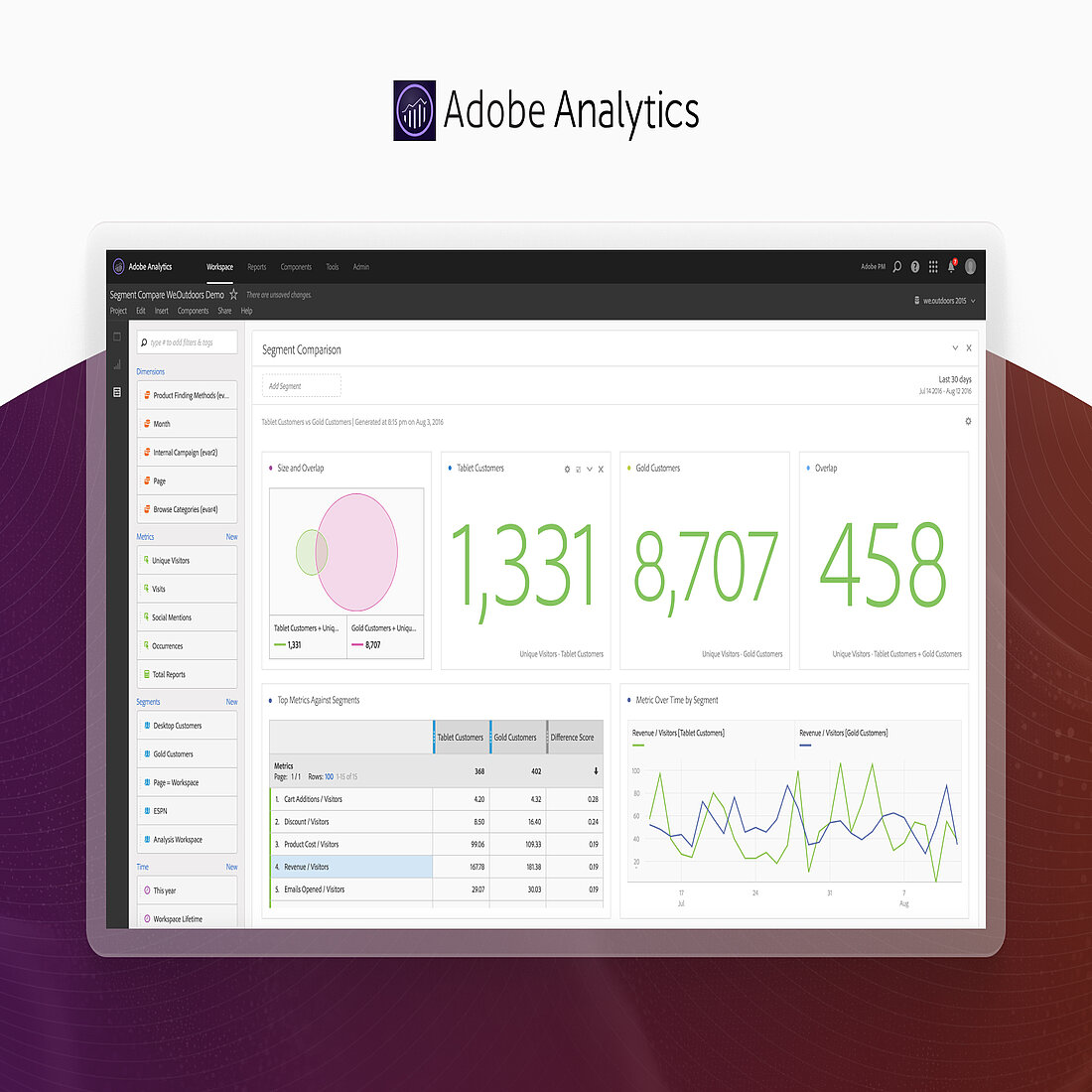
4. Adobe Analytics
Adobe Analytics is an enterprise analytics platform built for deep customer journey tracking, advanced segmentation, and AI-driven insights across digital channels.
Free Trial: 7 days (Experience Cloud trial).
Free Plan: No.
Pricing: Custom pricing only, typically starting around $2,000/month for small businesses.
What’s great about Adobe Analytics
Adobe Analytics delivers enterprise-grade web traffic reporting, giving businesses the ability to dig deep into page views, visitor paths, audience segments, and campaign performance across digital channels. It excels at handling massive amounts of data and provides real-time dashboards, custom variables, and flexible attribution modeling, making it a top choice for companies needing complete visibility into complex customer journeys. For organizations already using Adobe's ecosystem, it’s one of the most powerful website statistics tools available for understanding how visitors engage across devices and touchpoints.
What’s not so great
Adobe Analytics is prohibitively expensive for most businesses, with starting costs around $2,000/month and additional fees for features many expect out of the box. The platform's heavy reliance on tracking cookies undermines privacy efforts and leaves gaps as major browsers block its scripts. It also demands a steep learning curve, technical setup, and often third-party integration help to unlock its full reporting capabilities. Adobe Analytics lacks built-in visitor behavior tools like heatmaps or session recordings, meaning businesses focused purely on improving website user experience may find it incomplete without additional tools.
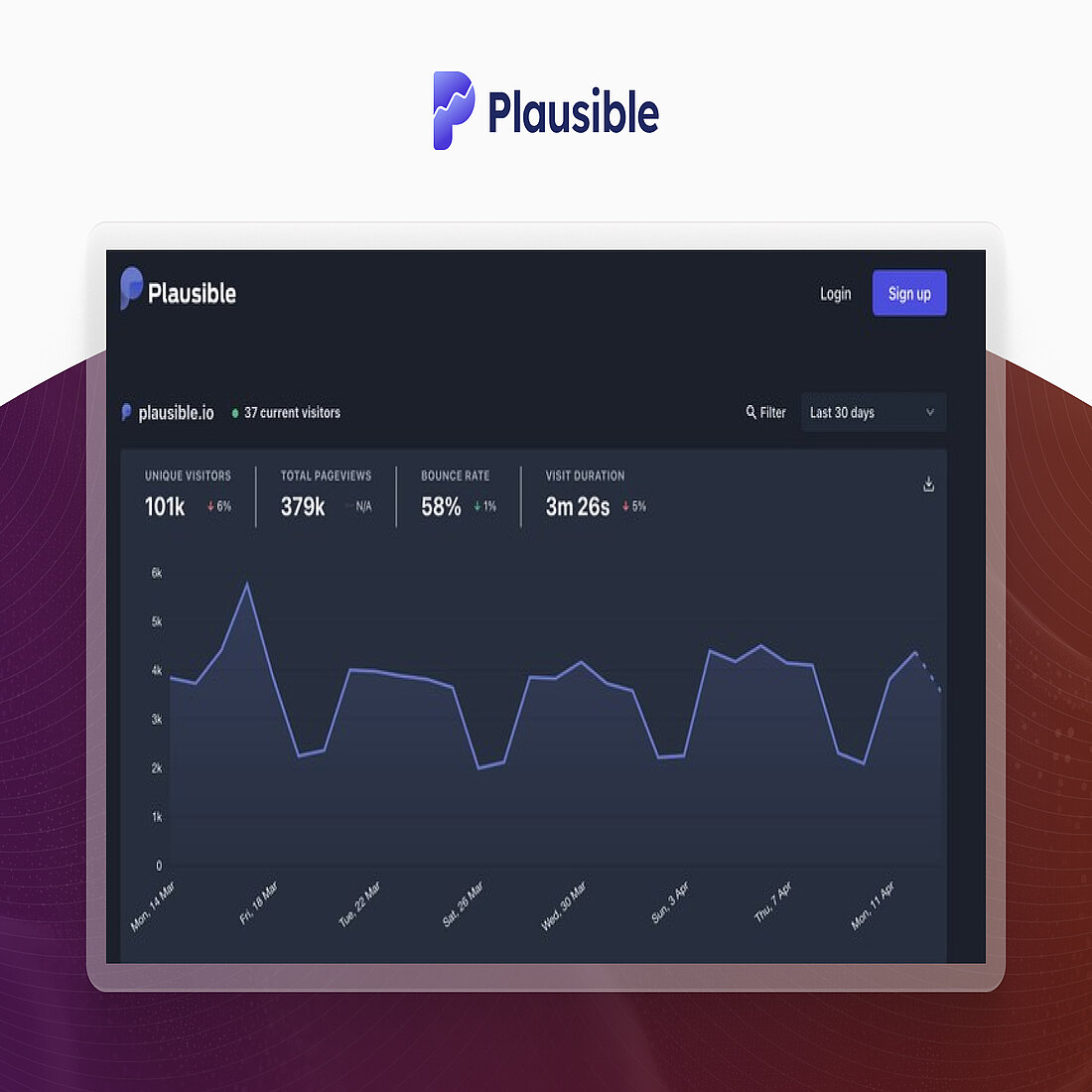
5. Plausible Analytics
Plausible Analytics is a simple, open-source website statistics tool focused on privacy and clarity. It offers essential metrics like page views, traffic sources, bounce rates, and goal conversions without using cookies or storing personal data.
Free Trial: 30 days.
Free Plan: No.
Pricing: Two paid plans, with prices starting at £9/mo. Additional custom enterprise plan also available.
What’s great about Plausible Analytics
Plausible is incredibly lightweight, with zero impact on page speed or performance scores. It tracks key metrics like page views, bounce rate, traffic sources, UTM campaigns, and supports goals and custom events. You can create private dashboard links for clients, which is perfect for sharing insights without needing user accounts. The self-hosted version is developer-friendly and works well in Docker, making it a strong choice for privacy-conscious users.
What’s not so great
The hosted version becomes expensive if you're managing multiple client sites. While self-hosting is an option, it can be tricky to set up for less technical users. Plausible also lacks built-in integrations with advertising platforms like Google Ads, which makes tracking conversions more difficult.
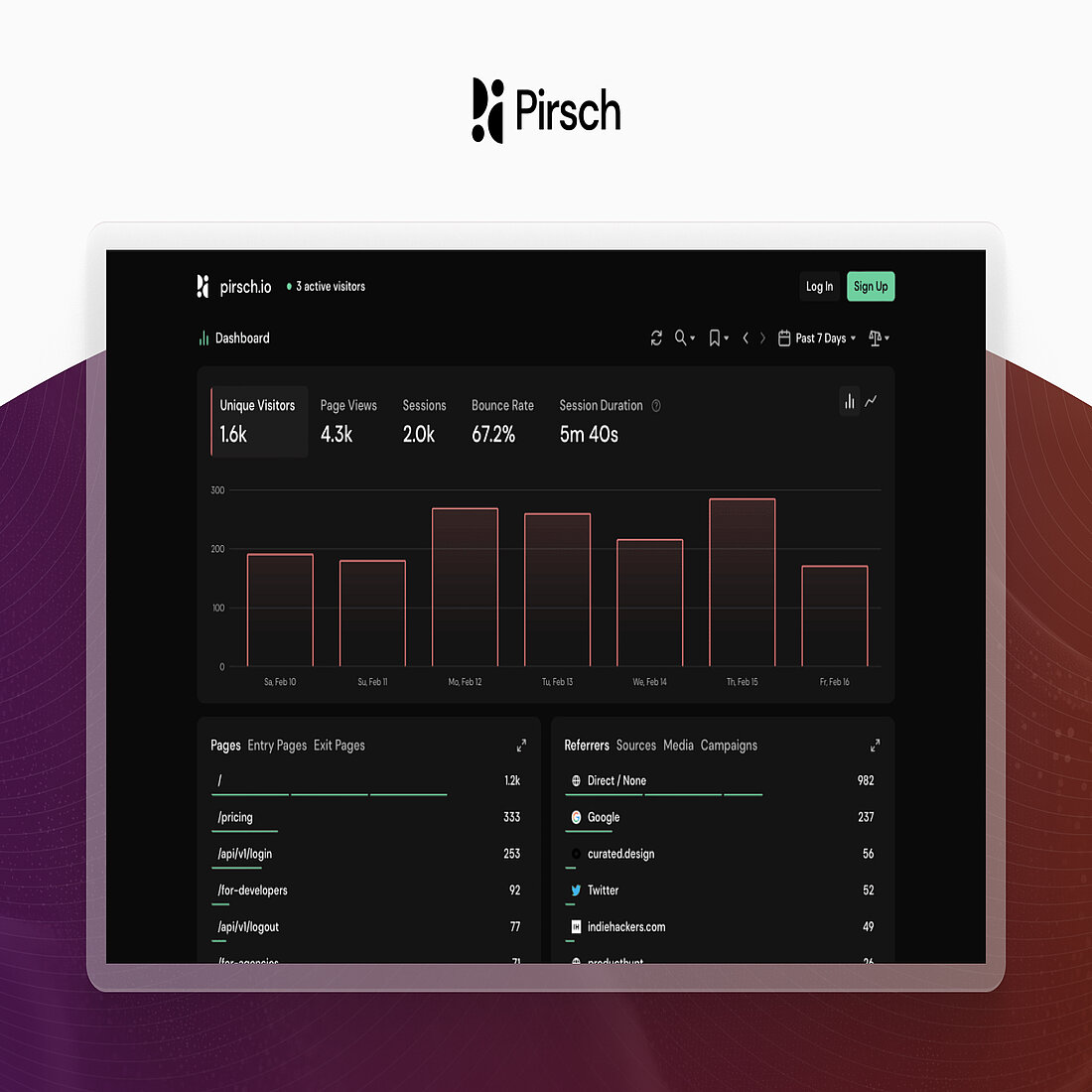
6. Pirsch Analytics
Pirsch Analytics is a lightweight, privacy-friendly website statistics tool designed for clean reporting without cookies or intrusive tracking. It delivers key metrics like traffic sources, page views, referrers, and device data through a sleek, embeddable dashboard.
Free Trial: 30 days.
Free Plan: No.
Pricing: Two paid plans, with prices starting at $6/mo. Additional custom enterprise plan also available.
What’s great about Pirsch Analytics
Pirsch is a privacy-first, cookie-free web statistics tool that’s especially popular with developers and SaaS founders. It offers beautiful dashboards with core metrics like page views, traffic sources, country-level data, and device types. What sets it apart is its ability to run server-side, which means it can't be blocked by ad blockers or tracking protections. You can embed the analytics into your own admin dashboards using the API, making it perfect for integrating traffic stats directly into client or product interfaces.
What’s not so great
Pirsch still falls short in advanced filtering and segmentation. You can’t easily combine conditions like source plus country plus page path, which limits its use for deeper pattern analysis. While the team is responsive and actively improving the platform, it also lacks goal tracking, funnel reporting, and campaign attribution tools that some analytics users consider essential for conversion optimization.
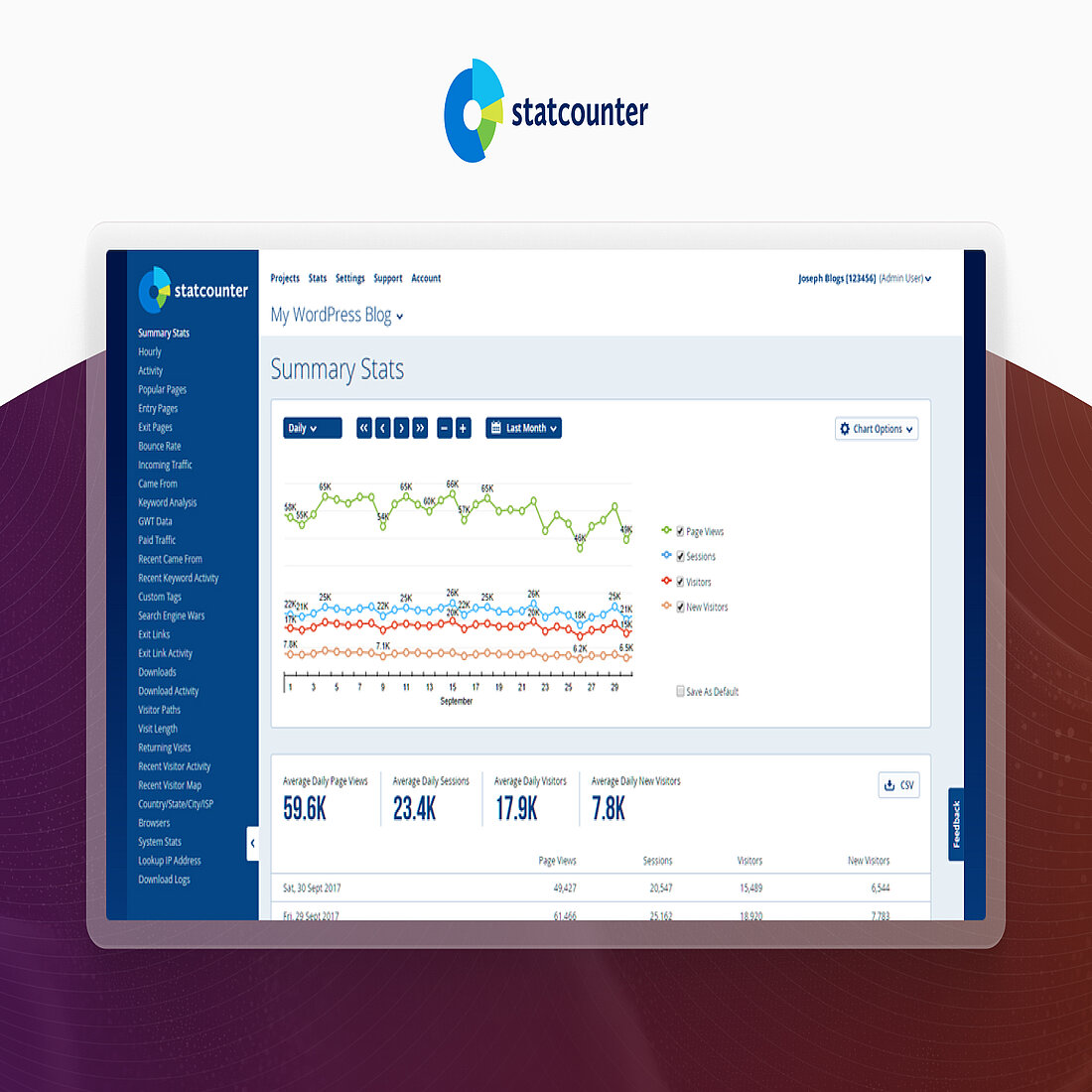
7. Statcounter
Statcounter is a long-standing website statistics tool known for its straightforward, real-time traffic tracking. It gives you live visitor logs, popular pages, referrers, and basic device data in an interface that’s easy to navigate.
Free Trial: 30 days.
Free Plan: Yes.
Pricing: Two paid plans, with prices starting at €16.
What’s great about Statcounter
Statcounter makes it easy to track visitor behavior in real time with clear, session-level data that includes visitor paths, exit links, time on page, browser details, and referrers. The Visitor Path tool is especially valuable for understanding how people move through your site and where they drop off. It's quick to set up, beginner-friendly, and ideal for monitoring marketing campaigns or testing layout changes. Exporting raw data for deeper analysis is straightforward, and it works well as a lightweight alternative for teams that want clarity without the overhead of advanced platforms.
What’s not so great
The interface feels outdated, and it is not possible to customize dashboards or streamline views for specific metrics. Statcounter does not support segmentation, custom event tracking, or goal definitions, so it falls short for more advanced analysis. We have also seen inconsistencies in location reporting, with visits occasionally attributed to the wrong country. Support response times can be slow, and there are limited integration options with third-party platforms. It is best suited for simple traffic tracking rather than in-depth marketing or conversion analysis.
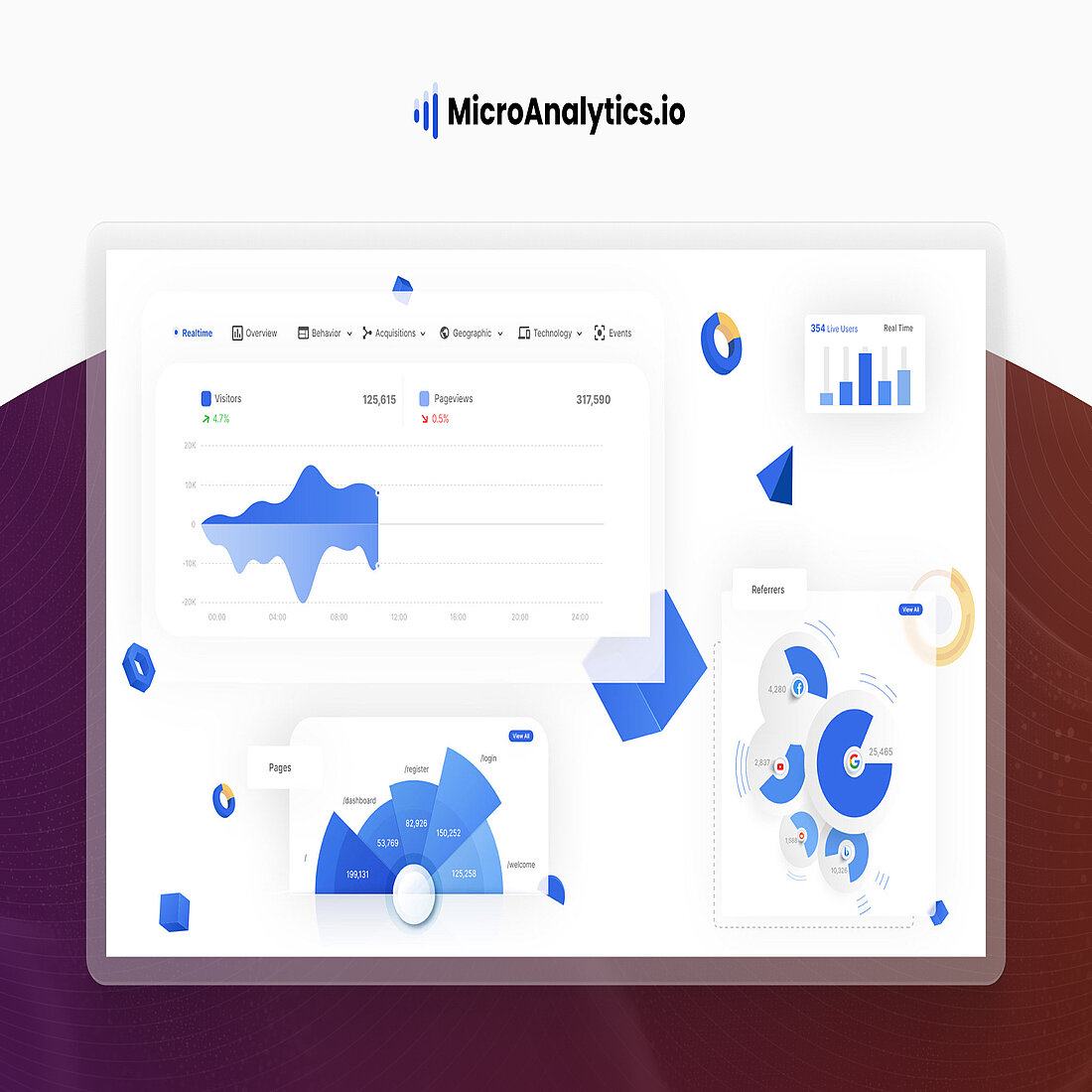
8. Microanalytics
Microanalytics is a privacy-focused website statistics tool built for speed and simplicity. It tracks essential metrics like page views, top pages, referrers, and locations, all without using cookies or collecting personal data.
Free Trial: 30 days.
Free Plan: Yes.
Pricing: Three paid plans, with prices starting at $9/mo.
What’s great about Microanalytics
Microanalytics is a minimalist, privacy-first website statistics tool that delivers clean and useful data without crossing regulatory lines. Setup is extremely fast - just one script in your header - and you’re instantly tracking page views, landing pages, referrers, screen resolutions, languages, and device types. The UI is elegant and distraction-free, making it ideal for solo creators, SMBs, or agencies managing multiple client sites who want a no-fuss dashboard. GDPR, CCPA, and PECR compliance is built in by default, so there’s no need for consent banners or complex legal reviews. Monthly email reports are a nice touch, and the ability to publicly share dashboards makes it useful for transparent projects or client reporting.
What’s not so great
While Microanalytics is excellent for basic site tracking, it lacks the depth needed for more advanced use cases. There’s no robust goal tracking, funnel reporting, or multi-dimensional filtering, and campaign tracking requires extra configuration. It also has limited eCommerce insights, which makes it less suitable for sites needing conversion rate optimization data. Some ad blockers can even block access to the dashboard itself, and the 1000-visitor limit on the free plan may be too low for growing projects. This tool is best when you want lightweight stats, not analytical deep dives.
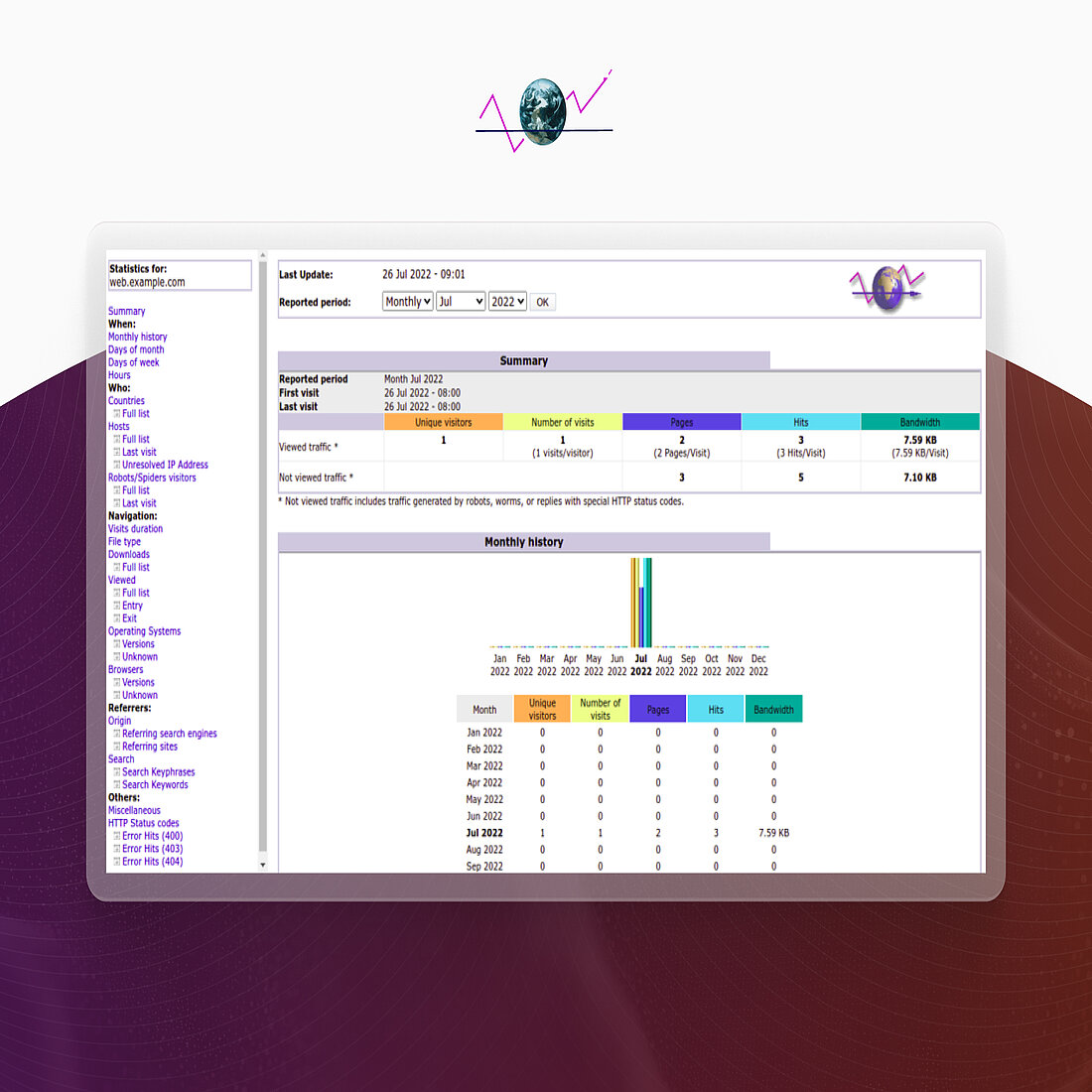
9. AWStats
AWStats is a server-side web statistics tool that processes raw log files to provide detailed insights into website traffic. It tracks metrics such as visits, referrers, bandwidth usage, operating systems, browser types, and bot activity, all without using cookies or client-side scripts.
Pricing: Free
What’s great about AWStats
AWStats is a server-side log analyzer that gives you direct access to visitor data without adding scripts or slowing down your site. It captures everything from IP addresses and bandwidth usage to browser types, HTTP errors, and bot activity, making it particularly useful for sysadmins, developers, and security teams. Since it works from raw log files, it can detect visits even when JavaScript-based trackers like Google Analytics are blocked. This makes it a solid backup tool for verifying anomalies, catching bots, or continuing basic traffic analysis during downtime. It’s also completely free, supports dozens of log formats, and requires no ongoing maintenance once installed.
What’s not so great
AWStats is showing its age. The interface is clunky, mobile-unfriendly, and not easily customizable. There’s no real-time reporting, no segmentation, and no built-in support for goal tracking, campaign analysis, or eCommerce. It also has trouble filtering out bot traffic, so you often get inflated visit counts and false positives unless you actively maintain IP blocklists. Data is split between HTTP and HTTPS, and parsing subdomain or redirect traffic can be awkward. While it can complement another analytics stack, it’s not a standalone solution for teams that need actionable insights or visual reporting.
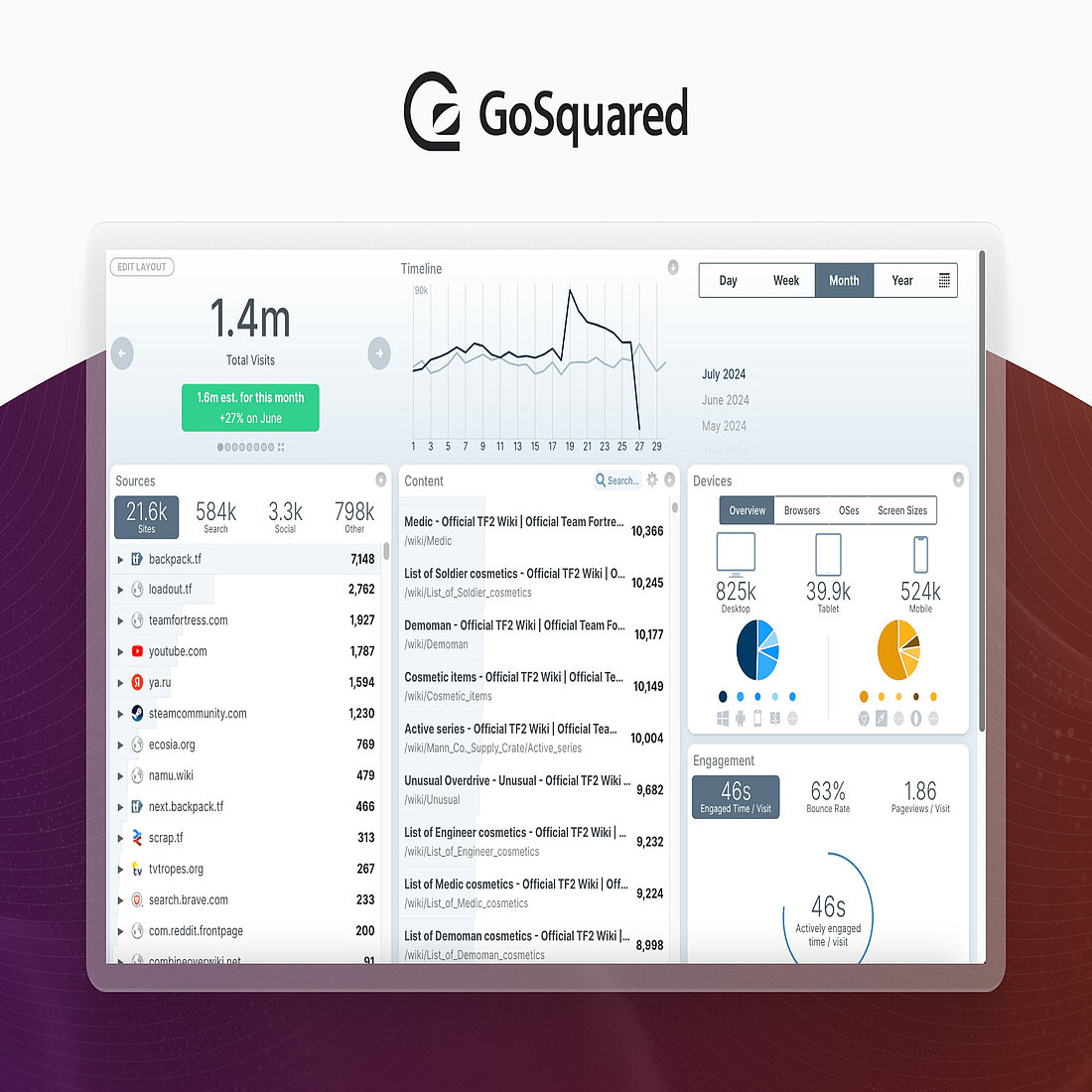
10. GoSquared
GoSquared is a real-time website statistics tool with a focus on clear, instant insights. It tracks traffic, top content, referrers, and device data through a fast, user-friendly dashboard designed for quick decision-making.
Free Trial: 7 days.
Free Plan: No.
Pricing: Four paid plans, with prices starting at £9.
What’s great about GoSquared
GoSquared stands out for its real-time website statistics, offering a live view of current visitors, traffic sources, and on-page activity. The platform’s Trends dashboard gives you instant feedback on which pages are being viewed and how visitors are navigating your site. This makes it especially useful for teams running time-sensitive campaigns or eCommerce operations. Setup is fast, the interface is clean, and it supports immediate decision-making with no learning curve.
What’s not so great
GoSquared blends analytics with customer engagement tools like live chat, lead capture, and email automation. While that adds value for some, it pushes up the price for users who only need web statistics. The reporting also lacks granularity in areas like landing page performance, and the mobile app is less reliable than the desktop version.
Share article
Get Started for Free
Gain World-Class Insights & Offer Innovative Privacy & Security

You might also like
What Is Website Analytics? A Guide to a Martech Cornerstone 06 September 2022 - by Simon Coulthard
06 September 2022 - by Simon Coulthard
Expert-Picked: 10 Trustworthy eCommerce Analytics Tools 24 February 2020 - by Simon Coulthard
24 February 2020 - by Simon Coulthard
Top 11 Website Analytics Tools in 2026 12 March 2020 - by Simon Coulthard
12 March 2020 - by Simon Coulthard










